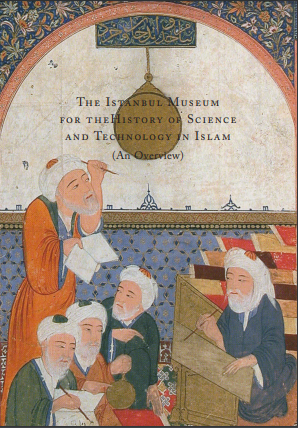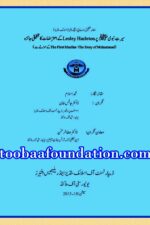History Of Science And Technology In Islam By: Fuat Sezgin
History Of Science And Technology In Islam By: Fuat Sezgin
History Of Science And Technology In Islam By: Fuat Sezgin
| BOOK AUTHOR | |
|---|---|
| Binding ( hard/ card) | "By inquiring about the products, you can get a hard copy, a pier back, or a candle. For this, please contact us on our WhatsApp number with your introduction, address, and details. Thank you |
| FORMAT | |
| LANGUAGE |
Related products
-
Qazi Sanaullah Panipati aur Tafseer e Mazhari ka Taarruf
Qazi Sanaullah Panipati aur Tafseer e Mazhari ka Taarruf
By : Dr rizwan u Deen Khan
With additional essay
Tafseer e Mazhari ka Naqidana Jaiza
By : Abu Mahfoz Alkareemi Maasomi
قاضی ثناء اللہ پانی پتی اور تفسیر مظہری کا تعارف
تالیف : ڈاکٹر رضوان الدین خاں
بشمولِ اضافہ
تفسیر مظہری کا ناقدانہ جائزہ
از : ابو محفوظ الکریمی معصومی
-
Qaumon ki Shikast o Zawal ke Asbaab ka Mutalia | قوموں کی شکست و زوال کے اسباب کا مطالعہ
قوموں کی شکست و زوال کے اسباب کا مطالعہ” ڈاکٹر آغا افتخار حسین کی ایک فکری اور تجزیاتی تصنیف ہے جس میں تاریخ، سماجیات اور فکری علوم کی روشنی میں اقوام کے عروج اور زوال کے بنیادی اسباب کا مطالعہ پیش کیا گیا ہے۔ یہ کتاب طلبہ، محققین اور فکری مطالعہ رکھنے والے قارئین کے لیے نہایت مفید ہے۔
-
-
AL MAHDI AND END OF THE TIME
AL MAHDI
AND END OF THE TIME
WRITTEN BY :
MUHAMMAD IBN IZZAT
MUHAMMAD ARIF
-
The Muwatta of Imam Muhammad (ENGLISH)
Imam Malik ibn Anas and Imam Muhammad ibn al-Hasan. This topic is of particular interest to students of hadith, as it relates to the transmission and narration of the Muwatta, a significant collection of hadith and legal rulings. Let’s break down the topic step by step:
- Imam Malik ibn Anas: Imam Malik (711-795 CE) was a prominent Islamic scholar and jurist who lived in Medina, one of the holiest cities in Islam. He is best known for compiling the “Muwatta,” which is a collection of hadith and legal rulings. Imam Malik’s deep knowledge of Islamic traditions, his reputation for integrity, and his proximity to the place where the Prophet Muhammad lived and taught gave his collection a special significance.
- The Muwatta: The “Muwatta” is a compilation of hadith and legal rulings organized by Imam Malik. It covers a wide range of topics related to Islamic law, ethics, social matters, and more. The Muwatta is highly regarded for its authenticity and is considered one of the earliest and most comprehensive collections of its kind.
- Imam Muhammad ibn al-Hasan: Imam Muhammad (also known as Muhammad al-Shaybani) was a distinguished student of Imam Abu Hanifa and a close companion of Imam Malik. He was also a scholar of Islamic jurisprudence and played a significant role in transmitting the teachings of his teachers.
- Narration of Imam Muhammad ibn al-Hasan: Imam Muhammad ibn al-Hasan narrated the Muwatta of Imam Malik. This means that he learned the hadith and legal rulings directly from Imam Malik and then transmitted them to others. Narrators like Imam Muhammad are crucial in preserving the authenticity of the hadith collection and ensuring that it is accurately transmitted from one generation to another.
In summary, the topic of “The Muwatta of Imam Malik ibn Anas in the narration of Imam Muhammad ibn al-Hasan” refers to the process of how Imam Muhammad ibn al-Hasan, a student of Imam Malik, learned and transmitted the Muwatta collection. This transmission helps maintain the accuracy and authenticity of the collection, making it a reliable source of guidance for students of hadith, scholars, and anyone seeking a deeper understanding of Islamic law and teachings.
The Muwatta of Imam Muhammad is an important and influential collection of hadith (sayings, actions, and approvals of the Prophet Muhammad) and legal rulings in Islamic jurisprudence (fiqh). It holds a significant place in Islamic scholarship and is highly regarded by scholars, jurists, and students of Islam.
Here are some key points that describe the importance of the Muwatta of Imam Muhammad:
- Authenticity: The Muwatta is considered one of the most authentic collections of hadith and legal traditions. Imam Muhammad ibn Hasan al-Shaybani, the author of the Muwatta, was a prominent disciple of Imam Abu Hanifa, one of the founders of the Hanafi school of Islamic jurisprudence. The hadith and legal rulings included in the Muwatta are meticulously selected for their authenticity, which adds to its credibility among scholars.
- Comprehensive Content: The Muwatta covers a wide range of topics, including rituals, ethics, social matters, family law, business transactions, and more. It provides a comprehensive overview of various aspects of Islamic life and jurisprudence, making it a valuable resource for understanding Islamic teachings and practices.
- Simplicity and Accessibility: One of the notable features of the Muwatta is its simplicity and straightforwardness. Imam Muhammad intentionally structured the collection in a way that makes it easy to understand and apply. This accessibility has contributed to its widespread use among scholars and students alike.
- Influence on Jurisprudence: The Muwatta played a crucial role in shaping the Hanafi school of jurisprudence and contributed to the development of Islamic legal thought in general. The hadith and legal opinions in the Muwatta served as foundational sources for deriving legal rulings and principles within the Hanafi tradition.
- Cross-Tradition Appeal: While Imam Muhammad was a follower of the Hanafi school, his Muwatta gained recognition beyond the Hanafi tradition. Scholars from other Islamic jurisprudential schools also appreciate the collection for its valuable insights into early Islamic legal and social practices.
- Historical Insight: The Muwatta provides a glimpse into the social, cultural, and legal dynamics of early Islamic society. It offers historical context for various legal rulings and practices, contributing to a better understanding of the development of Islamic law and the challenges faced by the Muslim community during that era.
- Preservation of Tradition: The Muwatta is an example of the efforts made by early Islamic scholars to preserve and transmit the teachings of the Prophet Muhammad and his companions accurately. It serves as a bridge connecting later generations with the practices and wisdom of the earliest Muslims.
In summary, the Muwatta of Imam Muhammad holds immense importance due to its authenticity, comprehensive content, influence on jurisprudence, accessibility, cross-tradition appeal, historical insights, and role in preserving Islamic tradition. It continues to be studied and referenced by scholars and students of Islam worldwide as a valuable source of guidance and knowledge.
Imam Muhammad ibn Hasan al-Shaybani, known as one of the “Two Companions,” is one of the distinguished disciples of Imam Abu Hanifa. Among his two prominent disciples, the other is Imam Abu Yusuf. Imam Muhammad’s works encompass all aspects of jurisprudence and law, and they are highly comprehensive. His significant contributions have greatly influenced later Hanafi scholars.
Within the Hanafi school of thought, Imam Muhammad al-Shaybani holds a central position. He is considered a key figure in Sunni jurisprudential tradition and a bridge between different schools of thought. Among his contemporaries, his esteemed scholars include both Imam Abu Hanifa and Imam Malik. Notably, Imam Shafi’i is also counted among his students, and Imam Ahmad ibn Hanbal, a student of Imam Shafi’i, further connects him to the third major school of thought. Thus, Imam Muhammad al-Shaybani’s teachings are intertwined with the founders of all four major jurisprudential schools, showcasing his profound influence.
-
MUHAMMAD (S.A.W) THE FINAL MESSENGER
Introduction
My endearing Dr. Maulvi Majid Ali Khan is a learned youth
who has had the privilege of having the education both in the
Western as well as in the Oriental ways. He not only obtained his
M.Sc. from the Muslim University, Aligarh, but also obtained
his Master of Theology degree and Doctorate in Sunni Theology
from there. Because of his zeal in Islamics, he also joined Dărul
‘Uloom (Arabic College), Meerut, on his own, in order to com-
plete his higher studies. He served as a lecturer in Islamic
Studies in the West Indies and then in the Deptt. of Sunni Theo-
logy at the Aligarh Muslim University. Now he is a lecturer in
Islamic Studies at the Jamia Millia Islamia, New Delhi. He is
the author of a number of books and articles on Islam in English
and Urdu and is continuously busy in writing. His most remark-
able feature is that he is an orthodox youth having sound
thoughts and great devotion for Islam.
It is a matter of pleasure that Saudi Arabia’s panel of judges
for the competition of “Research Works on Sirah” selected his
book on the “Sirah” (life of the Holy Prophet) for a coveted
award. I pray to Allah for a general recognition of his book,
Muhammad the Final Messenger, and so as to create the desire
among the readers to follow the “Sirah” of the Holy Prophet
(Sallallahu ‘alaihi wa Sallam).
Ist Şafar, 1399
(Ist January, 1979)
(Maulānā) Abul Hasan ‘Ali,
Rector (Nazim) Nadwatul Ulamā,
Lucknow (India).
toobaafoundation.com…………………………………….
Foreword
This book has the unique distinction of winning second of the
five awards of the value of SR 50,000.00; 40,000.00; 30,000.00,
20,000.00 and 10,000.00 respectively in a world competition
instituted by the Rabitat-al-‘Alam-al-Islami of Mecca (Saudi
Arabia). The judgement was given by a board of experts com-
prising great scholars of world reputation, both Arab and
non-Arab. Hence it needs no further introduction. There is no
dearth of books written in English on the life and works of the
Prophet of Islam (Sallallahu ‘alaihi wa Sallam). They however,
generally suffer from two defects: the books written by non-
Muslim authors, whatsoever scholarly they may be, lack in a
realistic approach, whereas the books, written by Muslim authors
sometime fail to represent the orthodox school of biographers
of the Prophet (Sallallahu ‘alaihi wa sallam).
This book, being safe from the above defects, can readily be
accepted as a novel and fine contribution to the “Sirat” litera-
ture in English. The main and salient features of the book may
hereunder be summed up:
(1) It is not merely a historical survey of the events related
to the life of the Prophet, but also contains an enlightened dis-
cussion of the socio-economic problems of the society in Madina
and their effective and just solutions by the Prophet.
(2) It repudiates quite convincingly and firmly the charges
levelled and the misgivings created by Western writers againstthe Prophet.
(3) The finality of the Prophet has been established on such
a firm basis as leaving no room for an inkling of doubt in the
matter.
(4) A new, modern and most up-to-date interpretation of
“Ghazawat” has been given in it, due to which one would defi-
nitely arrive at the conclusion that the Prophet of Islam never
adopted an aggressive way and that his mission was God-
guided.
(5) The basic sources of the book are the Qur’an and Hadith,
and then the original historical books.
(6) The most remarkable feature of the book is that it presents
the Personality of Muḥammad (Sallallahu ‘alaihi wa sallam) as
the most distinguished Prophet and not simply a reformer. Even
some of the leading biographers of our times have not succeeded
fully in this regard.
I am confident that this book will be of benefit to readers
in general.
8.1.1979
(Professor) Sa’id Ahmad Akberābādī
U.G.C. Professor,
Deptt. of Arabic,
Calicut University (India).
Formerly Dean Faculty of Theology,
The Aligarh Muslim University,
Aligarh (India).……………………………………………………….
-
Tahrik Pakistan Men Bangali Muslmanoo ka Numayan Tarieen Kirdarتحریک پاکستان میں بنگالی مسلمانوں کا نمایاں ترین کردار
This book Muslim Bengal is about the current Bangladesh, it examines the role of Bengali leaders in making Pakistan. The book is being presented by TOOBAA FOUNDATION https://toobaafoundation.com/. It should be noted that in 1971, Bengali Muslims made their own separate homeland with the help of India, which they named Bangladesh.









Be the first to review “History Of Science And Technology In Islam By: Fuat Sezgin”